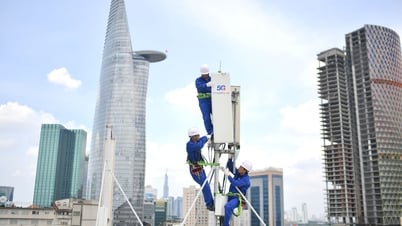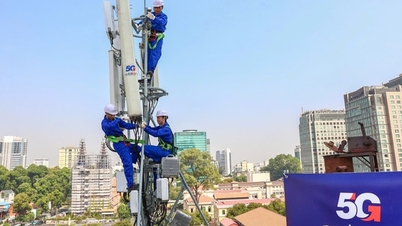John Hoffman, CEO of the international mobile operators association GSMA, stated that China is poised to have 1 billion 5G mobile connections by 2025.
China has been actively embracing 5G technology, especially in applying innovative business models across various industries.
This proactive approach has accelerated digital transformation in sectors ranging from mining, port management and manufacturing, demonstrating the huge potential of 5G technology across all business sectors.
As of September 2023, China had 3.189 million 5G base stations, covering urban areas of provincial- and county-level cities.

GSMA predicts that 5G technology will contribute nearly $1 trillion to global GDP by 2030, with nearly half of the growth coming from the services sector.
To accelerate the integration of 5G technology, China's Ministry of Industry and Information Technology has planned to deploy 5G in various fields, including manufacturing, mining, electric power, and port management.
Currently, 5G technology has been successfully deployed in 67/97 key areas of the Chinese economy.
With its ultra-fast connection speeds, widespread connectivity and low latency, 5G is set to revolutionize the way devices communicate and interact in IoT networks, paving the way for a more connected and efficient world in China.
One of the most notable features of 5G technology is its ability to handle an unprecedented number of devices simultaneously. While traditional cellular networks struggle to accommodate the massive volume of devices expected to join the IoT revolution, 5G’s advanced network architecture and improved spectrum efficiency can support up to 1 million devices per square kilometer.
This disruptive capability makes 5G the ideal technology to power the IoT ecosystem and drive exponential growth.
The increased capacity and speed provided by 5G will enable real-time processing and analysis of critical data, revolutionizing various industries. For example, in areas such as manufacturing, transportation, and healthcare, where split-second decision making is critical, 5G’s low latency will be a game-changer.
In a smart factory scenario, 5G can enable real-time monitoring and control of machines, optimize production processes, and minimize downtime, thereby improving overall operational efficiency.
Furthermore, 5G’s high bandwidth will facilitate the seamless transfer of large volumes of data, opening up new possibilities for complex IoT applications. For example, autonomous vehicles will benefit greatly from 5G’s capabilities, as it enables efficient data exchange between vehicles, transportation infrastructure, and cloud-based platforms.
This seamless flow of information will revolutionize real-time navigation and collision avoidance, dramatically improving road safety and paving the way for widespread adoption of autonomous driving technology.
In the development of smart cities, 5G is expected to have a profound impact on China's IoT ecosystem. Through its ability to connect an incredible number of sensors and devices, 5G will enable real-time data collection and analysis on various aspects of urban life, such as traffic flow, air quality, and energy consumption.
This invaluable information can be used to optimize city operations, allocate resources more efficiently, and improve the overall quality of life for citizens, promoting sustainable and prosperous communities.
Furthermore, 5G’s network slicing capabilities will play a key role in enabling the growth of the IoT ecosystem. This feature allows for the creation of dedicated virtual networks, customized for specific IoT applications.
By allocating separate network resources to each device or service, optimal performance and reliability can be ensured. Critical applications such as remote surgery or disaster response can be assigned a dedicated network, with guaranteed bandwidth and low latency, while less time-sensitive applications can share resources on a separate network segment, reducing infrastructure investment costs and optimizing system performance.
Overall, 5G technology is poised to redefine China’s IoT ecosystem and unlock its true potential. With its ability to support a large number of devices, low latency, real-time data processing, and high bandwidth, 5G will drive the transformation of a wide range of sectors, from manufacturing and transportation to healthcare and smart cities.
China's significant investments in 5G infrastructure put the country at the forefront of the global IoT revolution, positioning it as a leader in harnessing the power of connected technology for a smarter and more prosperous future.
(according to WMedia)

The Role of 5G in Driving Precision Agriculture Automation
The precision agriculture industry is seeing an increase in the use of automation to improve farming efficiency. 5G technology will be a powerful catalyst to accelerate this process.

Challenges in 5G network deployment
The rollout of 5G networks is expected to revolutionize the telecommunications sector. However, the journey to full 5G deployment will face many hurdles.

The race to deploy 5G globally is heating up
As the world moves into a new era of technology, pioneering the deployment of 5G has become an important focus for many countries.
Source


![[Photo] Ho Chi Minh City: Many people release flower lanterns to celebrate Buddha's Birthday](https://vphoto.vietnam.vn/thumb/1200x675/vietnam/resource/IMAGE/2025/5/10/5d57dc648c0f46ffa3b22a3e6e3eac3e)































![[Photo] General Secretary To Lam meets with Chairman of the Federation Council, Parliament of the Russian Federation](https://vphoto.vietnam.vn/thumb/1200x675/vietnam/resource/IMAGE/2025/5/10/2c37f1980bdc48c4a04ca24b5f544b33)

































































Comment (0)